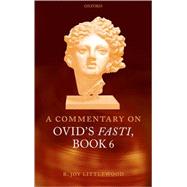A Commentary on Ovid's Fasti, Book 6
, by Littlewood, R. Joy- ISBN: 9780199271344 | 0199271348
- Cover: Hardcover
- Copyright: 8/24/2006
"After a period of neglect, the Fasti, Ovid's elegiac poem on the Roman calendar, has been the focus of much recent scholarship. Joy Littlewood suggests that Book 6 is unified by the theme of War, so providing a framing bracket to balance the dominant theme of Peace in Book I. While January celebrates the blessings of Augustan peace, June presents a multifaceted portrait of Roman war, a uniquely Roman combination of virtus and pictas. The three goddesses who dispute the origin of the month in the Proem have associations with military success and Roman power, a distinguishing characteristic that they share in varying degrees with the goddesses whose festivals fall in June (Carna, Vesta, Mater Matuta, Fortuna, and Minerva), most of whom, like Juno of Lanuvium, are also the focus of women's cult. Throughout the month, republican military conflicts are recalled in temples vowed and anniversaries of victory and defeat in Rome's struggle for hegemony. Finally, a complex extended epilogue, which culminates in the celebration of Hercules Musarum, coalesces with familiar themes of Augustan ideology: apotheosis, dynastic eulogy, and the monuments of the Pax Augusta. These and other themes are discussed in the Introduction to the Commentary, which includes analyses of the literary and historical background of the work, Augustus' dynastic restructuring of Roman religion, as evinced in the iconography of his new monuments, Ovid's adaptations of material from Livy's Histories and Horace's Roman Odes, his narrative technique, and his expansion of the elegiac genre through the antiquarian content of the book. Fascinating literary questions are raised by the poet's audacious violation of generic boundaries, no less than by his inclusion of sound antiquarian material artfully camouflaged by literary allusion. Ovid's Fasti Book 6 offers new insights into the complex role played by religion in Roman life."--BOOK JACKET.







